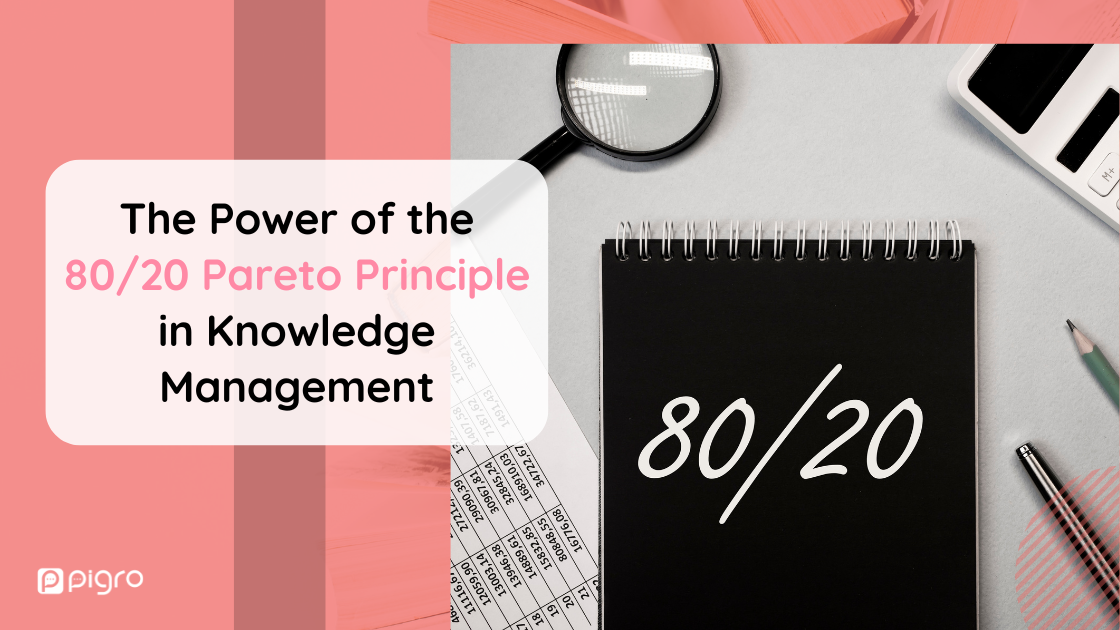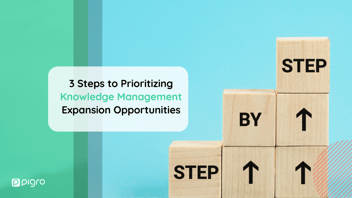Introduction
The 80/20 Pareto Principle, named after Italian economist Vilfredo Pareto, suggests that roughly 80% of outcomes result from 20% of causes.
This principle transcends industries and disciplines, offering a profound insight into the distribution of effort and impact.
In the realm of knowledge management, understanding and leveraging this principle can revolutionize how organisations approach information, decision-making, and productivity enhancement.
Let's delve into how the 80/20 principle intersects with knowledge management strategy and its implications for enterprise search, knowledge gap analysis, decision-making processes, and the curation of tacit knowledge, with the aid of AI.
1. Understanding Knowledge Management Strategy:
Knowledge management strategy entails the systematic process of creating, sharing, using, and managing knowledge and information within an organization to achieve its objectives.
Embracing the 80/20 principle in this context involves identifying the vital few sources of knowledge that drive the majority of value creation.
It necessitates prioritizing the allocation of resources towards these critical areas to maximize efficiency and impact.
2. Unveiling Enterprise Search Efficiency:
Enterprise search systems play a pivotal role in knowledge management by facilitating the discovery and retrieval of information within vast organizational repositories.
Applying the 80/20 principle to enterprise search involves identifying the top 20% of high-value documents, datasets, or repositories that yield 80% of the insights needed for informed decision-making.
By optimizing search algorithms and indexing methods to prioritize these crucial sources, organizations can streamline information access and enhance productivity.
3. Bridging the Knowledge Gap:
The 80/20 principle sheds light on knowledge gaps within organizations, highlighting the critical areas where additional information or expertise is required to drive optimal performance.
By leveraging AI-driven analytics and machine learning algorithms, organizations can identify the 20% of knowledge deficiencies that contribute to 80% of operational inefficiencies or missed opportunities.
Addressing these gaps through targeted learning initiatives, collaborative platforms, or expert networks enables organizations to harness untapped potential and drive continuous improvement.
4. Bridging the Knowledge Gap:
Incorporating the 80/20 principle into decision-making processes empowers organizations to focus on the most influential factors or variables that drive outcomes.
By prioritizing the 20% of key metrics, insights, or expertise that yield 80% of the desired outcomes, decision-makers can make more informed and impactful choices.
AI-powered decision support systems further enhance this approach by analyzing vast datasets, identifying patterns, and providing actionable insights in real time, thereby enabling agile and data-driven decision-making.
5. Bridging the Knowledge Gap:
Tacit knowledge, often described as the expertise, intuition, and know-how embedded within individuals, plays a crucial role in organizational performance and innovation.
The 80/20 principle emphasizes the significance of tacit knowledge by recognizing that a minority of individuals possess expertise that drives a majority of value creation.
Leveraging AI-driven knowledge curation tools, organizations can capture, codify, and disseminate tacit knowledge effectively, ensuring that valuable insights are shared and utilized across the organization to boost productivity and foster a culture of continuous learning.
Conclusion
The 80/20 Pareto Principle serves as a powerful lens through which organizations can optimize their knowledge management strategies, enhance enterprise search efficiency, bridge knowledge gaps, improve decision-making processes, and leverage tacit knowledge for productivity improvement.
By identifying and prioritizing the vital few sources of knowledge that drive the majority of value creation, organizations can unlock hidden potential, drive innovation, and gain a competitive edge in today's rapidly evolving business landscape.
Embrace the 80/20 principle, harness the power of AI, and propel your organization towards greater efficiency and insight.
Read also:
- Unraveling Knowledge Management Challenges: The AI Infusion Debate
- 3 Steps to Prioritizing Knowledge Management Expansion Opportunities
Want to know more about Pigro? Contact us!



